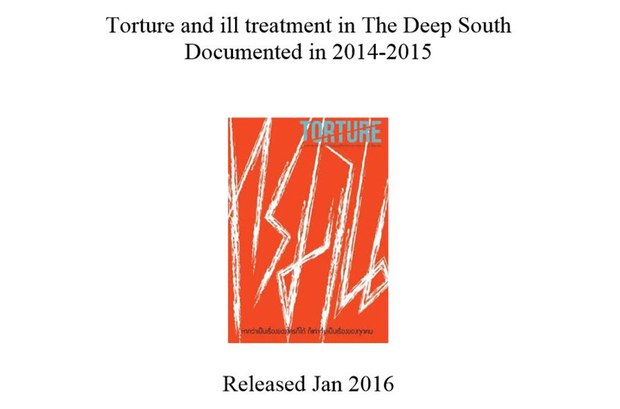Rights Groups: Thailand Tortured Suspected Insurgents
2016.02.10
 The Cross-Cultural Foundation, the Duay Jai Group and the Patani Human Right Organization released this report on torture in Thailand’s Deep South, Feb. 10, 2016.
The Cross-Cultural Foundation, the Duay Jai Group and the Patani Human Right Organization released this report on torture in Thailand’s Deep South, Feb. 10, 2016.
A group of human rights organizations is accusing Thai officials of systemic torture of suspected rebels taken prisoner in the restive Deep South, and is calling on the military-controlled government to work with them to end such abuses.
The accusation surfaced in a new report issued jointly on Wednesday by the Cross-Cultural Foundation (CrCF), the Duay Jai (Hearty Support) Group and the Patani Human Rights Organization (HAP). The groups released the report during a seminar at Prince of Songkla University in Pattani, a province in the Deep South.
Government officials challenged the report’s findings.
The three organizations learned of alleged cases of torture from 2004 through the end of 2015, and are urging the government to use the report’s findings to fix any wrongdoing, said Pornpen Khongkachonkiet, the director of the Cross-Cultural Foundation.
“We want to join with the government to help solve the problem. We want the government to set up a credible committee we can trust to jointly solve the problem,” Pornpen told BenarNews.
“We are not accusing all officials, but we believe there are some officials who continue using torture. Not all officials,” she said.
Somchai Hom-la-or, who directs one of Thailand’s largest rights advocacy groups, the Human Rights and Development Foundation, echoed the call by the three NGOs.
Separately, he warned separately that, if allowed to go on, torture could contribute toward undermining efforts to end the southern insurgency peacefully.
“We want all security officials involved with arresting, detaining and investigating suspected individuals to halt torture at once. The government must punish the wrong-doers, give justice to victims and their families, otherwise it will severely affect the effort to solve the Deep South troubles,” Somchai said in a news release.
A deputy spokesman for Internal Security Operation Command (ISOC) Region 4 in Pattani called the 49-page report inaccurate.
“I confirmed that officials never torture suspects under custody. The officials strictly adhere by the laws,” Col. Yutthanam Phetmuang told BenarNews by phone.
Torture claimed
The report by the three rights organizations is based on the accounts of 54 suspected insurgents between the ages of 19 and 48 who were held by the military.
Martial law, which is in force across the heavily militarized Deep South, allows for seven days of detention in a military camp, while an emergency decree allows seven days for similar custody in any special place. With a court’s consent, officials may detain a suspected person for up to 30 days.
“Although the laws granted special powers to the authorities to restrict certain freedoms and liberties of people in special circumstances, there is no law, both domestic and international, that grants authorities the power to inflict torture or cruel, inhumane or degrading treatment and punishment,” the report said.
According to the report, all detainees are Muslim and Malay-speaking locals from the region. It also details cases of torture that occur upon arrest, and while the suspect is being transported and questioned.
The detainees are denied the opportunity to consult with relatives or a lawyer, and they are not allowed bail, have limited family visitation or are incarcerated in secret places, the report said.
“The detainees under special laws went through inquiry process carried out by officials who asked them whether they had a hand in violence or are involved with any insurgent groups,” said the report, claiming that torture was used to coerce confessions from suspects.
The report points to three methods of torture – psychological, physical and inhumane treatment.
Physical torture includes water boarding, Chinese water torture – where cold and hot water is poured over the forehead or other body part – electrocution and sexual assault.
“While they were questioning me, they also attacked me by kicking, slapping and punching. Three out of seven officials took me to a fish pond in the Special Force Compound, then they dunked me in the pond,” a detainee recalled about an incident in February 2007.
The CrCF said five detainees died while in custody since 2007. However, the most recent case of Abdullayi Dorloh, 42, who died on Dec. 4, 2015, showed no sign that he was beaten, according to a forensic doctor at Prince of Songkla University.
Prayuth: Thailand developing technology to detect perpetrators
Since 2004, more than 6,500 people have been killed and close to 12,000 injured in more than 15,000 violent incidents associated with the conflict in Thailand’s southern border region.
The statistics give Thailand a bad name, Prime Minister Prayuth Chan-o-cha told an ISOC meeting in Bangkok on Wednesday.
“When I met foreign counterparts abroad, they believed Thailand has terrorists and is most at-risk of terror attacks in ASEAN (Association of Southeast Asian Nations),” he said.
Prayuth said insurgent attacks only took place in the Deep South.
And since the regional bloc’s 10 member-states formed the ASEAN Economic Cooperation zone to allow more freedom of movement, he said the Thai government was developing adequate technology, including cameras, to prevent people suspected of being involved in terrorism from crossing borders.
“Watch out for extremists,” he said, adding, “I don’t want Thailand to be a part of any conflicts. We want our country to be free, to make choices of our own of what we do, but still adhere to international obligations.
“Don’t think that our country is safe, because there are no safe countries,” he said.







